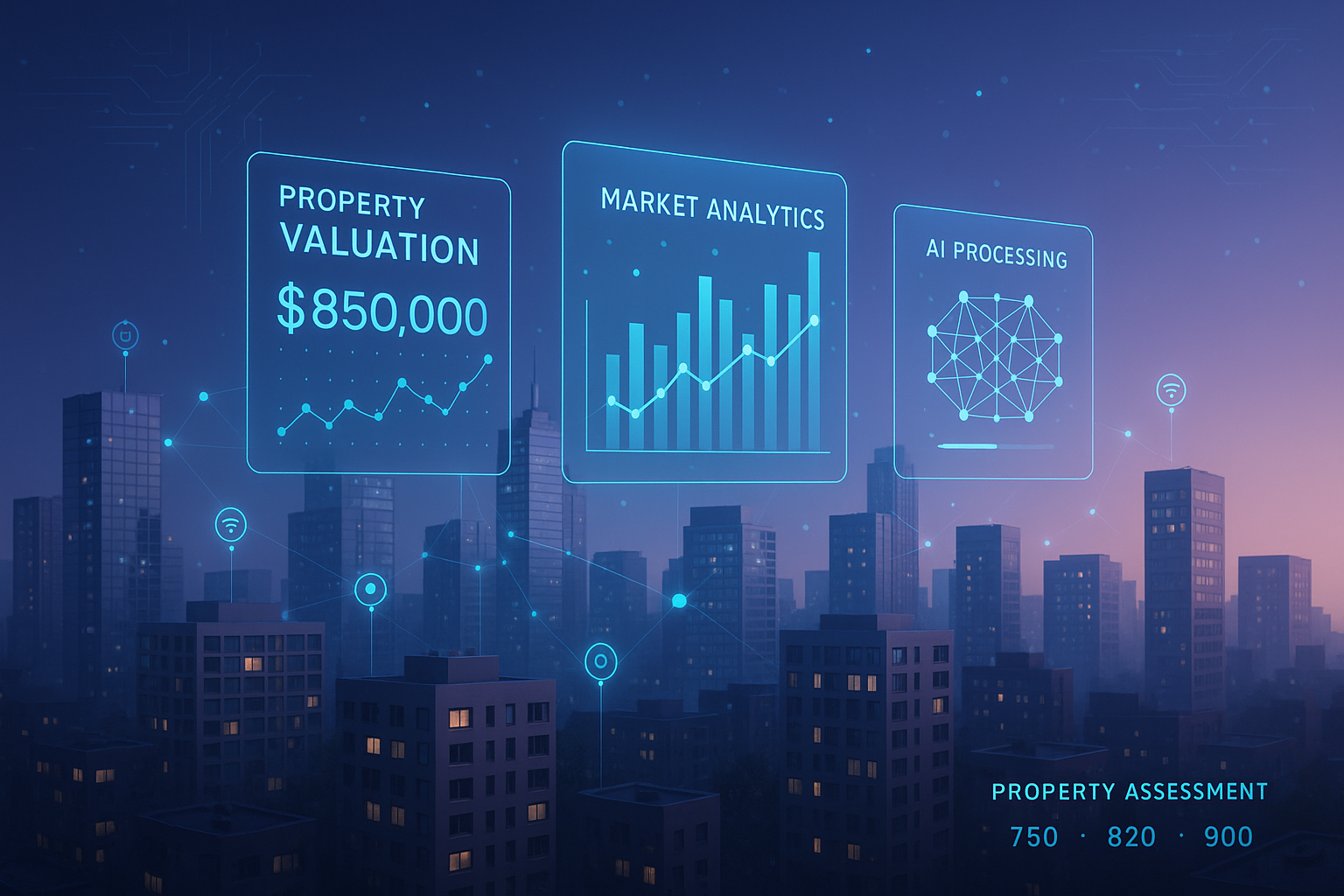
Unlocking Productivity: How AI Tools are Revolutionizing Residential Real Estate for Agents in 2024
Caiyman.ai Research Team
AI Solutions Architect
AI adoption in residential real estate isn’t just a trend—it’s a seismic shift that’s redefining what it means to be a productive, competitive agent in 2024. As the sector’s value surges beyond $222 billion with an anticipated 36.1% growth this year, even the most traditional firms are recognizing that strategic AI integration is now essential, not optional (InvestGlass). This blog delivers field-tested strategies, real agent success stories, and expert tool recommendations for every stage of the agent workflow—making it your practical guide to outperforming the competition, starting today.
AI-Driven Property Valuation and Market Analysis: Precision at Scale
The days of relying solely on basic comparables or instinct are over. Property valuation algorithms powered by machine learning and computer vision now synthesize massive datasets, from tax records to property images, producing lightning-fast, highly accurate appraisals. Tools like HouseCanary, CoreLogic, and Zillow Zestimate consistently deliver valuation error reductions of 18-20%, even in volatile markets (Appinventiv).
Automated Property Valuation Tools
AI platforms such as HouseCanary and CoreLogic combine machine learning with computer vision, using property data and photos to generate valuations in seconds. Zillow Zestimate, for example, compares over 500 variables per property, offering median error rates as low as 2-4%. These advances support agents with pricing accuracy that not only informs negotiations but can also enhance seller confidence and reduce deal fallout (Mobile Reality).
AI for Predictive Market Analysis
AI-driven market analysis platforms like REalyse, Keyway, and Skyline AI integrate structured data (MLS, economic reports) and unstructured sources (news, social media) using predictive analytics and natural language processing (NLP). This gives agents precise tools for segmenting neighborhoods, forecasting appreciation, and discovering emerging trends. Results include over 20% improvement in trend forecasting accuracy and tangible investment wins, such as funds using NLP to spot distressed assets and secure properties at 18% below market value (Appinventiv).
Lead Generation and Client Communication: From Prospecting to Loyalty with AI
Today’s agents use AI-powered systems to handle the grind of prospecting while delivering personalized engagement to every lead. Automated lead scoring models (think PropStream, RealPage Knock CRM) identify hot prospects based on behavioral signals, while chatbots like Zuma’s Kelsey AI and Apartment Ocean offer tailored answers and book appointments 24/7.
Automated Lead Generation and Nurture
Platforms such as PropStream and RealPage Knock combine machine learning, CRM data, and marketing automation. For example, leads captured through online forms can be routed directly into the CRM, analyzed for intent, then receive instant, AI-personalized email drips and SMS reminders—freeing agents to focus on warm prospects and complex deals. Adoption typically yields increases in lead conversion and less time spent on manual follow-ups (Forbes).
Client Communication Chatbots and Assistants
AI chatbots aren’t just scripted autoresponders; modern solutions like Zuma’s Kelsey AI and RealScout hold meaningful conversations, answer FAQs, and provide curated property recommendations on-demand. These tools reduce agent response times by up to 50% and boost client satisfaction scores, especially in competitive markets where immediate service can make all the difference (Appinventiv).
Seamless Transactions and Smarter Property Management with Automation
Top-producing agents are automating paperwork, compliance, and tenant communications to unlock new productivity. End-to-end platforms like Yardi Virtuoso AI, AppFolio AI, Entrata ELI+, and industry leaders like Prophia and Grooper use advanced AI—including NLP and Optical Character Recognition (OCR)—to extract information from contracts, automate e-signature and reminders, and flag risks or anomalies in real time.
AI in Transaction Management
Solutions such as ICE Mortgage Technology, Prophia, and Grooper accelerate closings and slash manual errors by extracting and verifying contract data, orchestrating approval workflows, and managing compliance tasks automatically. The impact is clear: reduced transaction cycles, fewer costly mistakes, and enhanced transparency for clients and stakeholders.
AI-Enabled Property Management
AI doesn’t stop at transactions—platforms like Yardi Virtuoso AI and AppFolio AI optimize ongoing operations. Predictive analytics drive proactive maintenance scheduling, dynamic rent pricing, and automated tenant requests. Companies using these tools see an 18-30% drop in operational costs, 8% increases in rental yields, and measurable improvements in tenant retention (Appinventiv).
Mortgage Technology Innovations: Accelerating and Securing the Deal
AI is transforming the mortgage process for both agents and their buyers. ML-powered credit risk models (from C3.ai, CoreLogic, Beeline, ICE Mortgage Technology, Finastra, and nCino) assess borrowers more accurately than FICO alone. Automated document verification via NLP and fraud detection algorithms speed up approvals, reducing manual workloads for lenders and eliminating common delays. These advancements support a roughly 15% increase in mortgage origination rates, making agents more competitive and boosting client satisfaction (HouseCanary).
Expert Strategies for Successful AI Integration in Residential Real Estate
- Choose AI tools that fit your needs: Clarify your priorities (valuation, lead generation, client comms, transactions) and vet vendors for data quality, CRM/MLS integration, and intuitive interfaces (AscendixTech).
- Pilot and onboard thoughtfully: Start with trial runs, get agent buy-in through training, and build feedback loops to refine tool use.
- Prioritize compliance and ethics: Confirm GDPR/CCPA, fair housing, and data security standards. Insist on transparency with clients and monitor for bias, especially in pricing and credit screens.
- Measure what matters: Set KPIs for lead conversion rates, response times, time saved, satisfaction, and ROI; use platform dashboards and agent feedback.
- Anticipate challenges: Address data quality at the outset, maintain a strong human-AI balance, and set realistic expectations for returns. Continuous improvement is critical (Rapid Innovation).
The AI-Driven Agent: Outperforming the Competition in 2024 and Beyond
Agents who embrace AI aren’t just staying afloat—they’re sailing ahead. Across the workflow, AI means fewer errors, higher conversions, increased revenue, and happier clients. Market leaders use these tools to build future-proof businesses while laggards risk falling behind as expectations for speed, accuracy, and service rise across the industry (HousingWire).
Ready to Supercharge Your Real Estate Career with AI?
Take stock of your current pain points and pick one top-rated AI platform from this guide to pilot today. Whether you’re struggling with too many cold leads, time-consuming paperwork, or slow transaction cycles, there’s a proven solution ready for you. If you’d like a downloadable checklist or quick-start guide for evaluating and piloting real estate AI tools, explore these recommendations or reach out to our team!
Sources
- InvestGlass: Top AI Agent for Real Estate: Revolutionizing the Industry in 2025 (Accessed 2025-05-12)
- HouseCanary: 5 AI Tools for Real Estate Agents (Accessed 2025-05-12)
- Appinventiv: Top 16 Use Cases and Real World Examples of AI in Real Estate (Accessed 2025-05-12)
- HousingWire: 18 Indispensable AI Tools for Real Estate Agents (Accessed 2025-05-12)
- Forbes: How Artificial Intelligence Is Changing The Real Estate Market (Accessed 2025-05-12)
- Rapid Innovation: AI Revolution in Real Estate: Enhancing Markets and Operations (Accessed 2025-05-12)
- AscendixTech: Real Estate Technology Trends of 2024-2025 (Accessed 2025-05-12)
- Mobile Reality: How AI is Reshaping Real Estate Markets (Accessed 2025-05-12)
Share this article
Related Articles

How AI is Transforming Real Estate in 2025: From Domain-Specific LLMs to Automated Valuations
Discover how AI innovations like Real-GPT, advanced AVMs, and computer vision are revolutionizing property valuation, achieving 95% accuracy while reducing costs by 30% and transforming decision-making across the real estate industry.

How AI is Democratizing Real Estate: The PropTech Revolution Making Investing Accessible to Everyone
Discover how AI is breaking down traditional barriers in real estate investing, making sophisticated market analysis and property management tools accessible to everyday investors through innovative PropTech solutions.

How AI Is Transforming Property Valuation: 2025 AVM Market Analysis and Predictions
The AI revolution in real estate is accelerating with automated valuation models reaching 99% accuracy and a market projected to hit $303.06 billion in 2025.